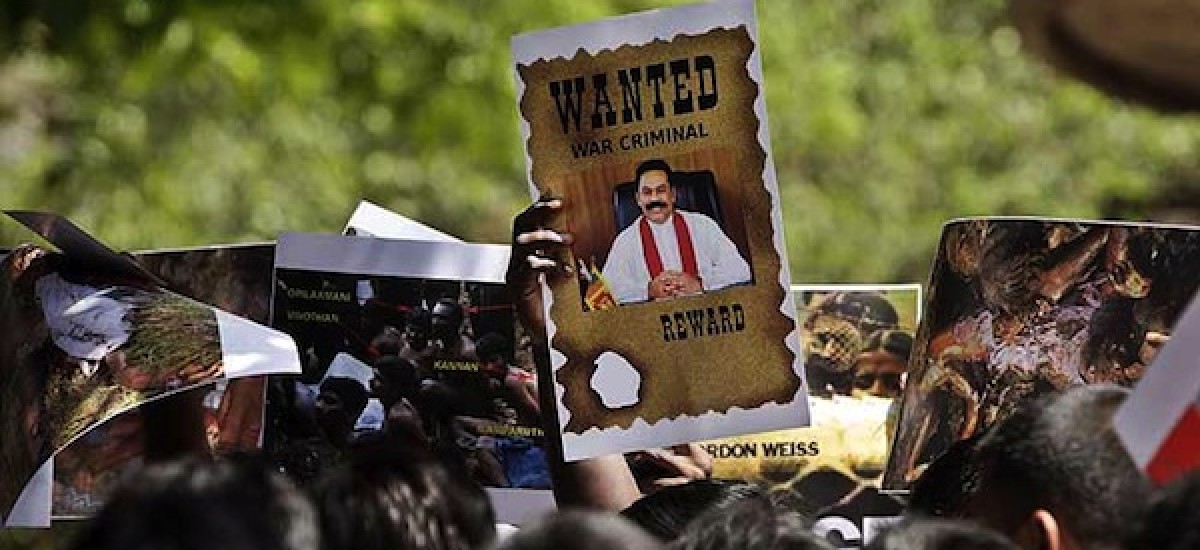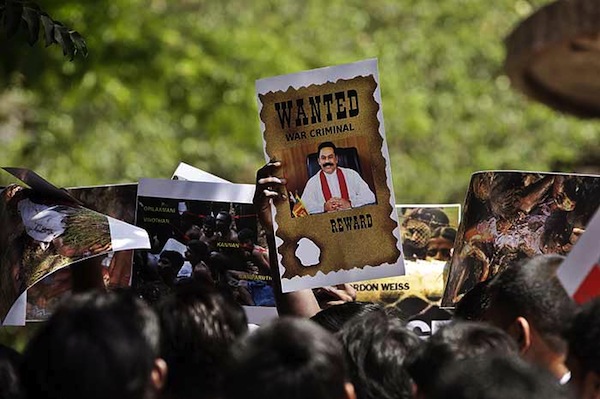Image courtesy India Ink blog by New York Times/Rajanish Kakade, Associated Press
As the 19th session of the Human Rights Council progresses, the discourse on Sri Lanka with reference to Human Rights is reaching its annual climax. It is annual in the sense that it has been reaching the said level of climax each year ever since the United Nations Human Rights Commission took up the issue after the completion of war in Sri Lanka. In the first two sessions Sri Lanka managed to defeat the Resolutions forwarded by the Western countries with the support of its allies from various quarters of the world, most prominently from China and Russia. India, a part of Sri Lanka’s support system, continued to assist Sri Lanka beyond the platform of the UNHRC despite the opposition from its South Indian Tamil constituency[1]. However, India’s silence amidst the mounting protests by Tamil Nadu MPs has created sense of uncertainty for Sri Lanka which is more to do with Sri Lanka’s fate at the UNHRC platform and future of the reconciliation process than on the bilateral relations of both countries. Simultaneously, there is a bigger question whether whatever decision by India or by the UNHRC would actually be able to render justice and safeguard the rights of the citizens in Sri Lanka.
The current protests from Tamil Nadu and its political élite who support the US resolution[2] have managed to form a wide spectrum by going beyond the usual gang of DMK and AIADMK by encompassing other political parties such as CPI (M) and BJP. In some sense it explains the deepening and widening emotions in the Tamil Nadu at the people’s level. As we wait for voting at the UNHRC on March 23, various nuances in New Delhi-Tamil Nadu exchanges provide an interesting case study to observe the domestic and foreign policy nexus. UPA’s response to the MPs’ protests which came in the form of EAM’s statement in the Parliament[3] and PM’s letter to DMK leader Karunanidhi[4] highlights the advantages in engaging the Government of Sri Lanka (GoSL) constructively and the need “to achieve a forward looking outcome […] rather than deepening confrontation and mistrust between the concerned parties”[5] . EAM’s statement also includes a reference to “the full implementation of the 13th Amendment to the Sri Lankan Constitution” in order “to achieve meaningful devolution of powers and genuine national reconciliation”[6]. The Minister also goes onto emphasise on the need to concentrate on the implications on “historically friendly relations with a neighbouring country”[7]. In its initial responses to the demands from Tamil Nadu MPs to support the US resolution, Pranab Mukherjee, the Leader of the House stated that India “normally do[es] not support any country-specific resolution”[8].
None of the responses from New Delhi suggest of a possible vote in favour of the resolution. However, three scenarios can be anticipated given the options for India.
- A vote against Sri Lanka by India and a possible victory for the coalition led by the US would have negative impacts on the reconciliation process in Sri Lanka due to the rate of growth in Sinhalese nationalism which encroaches into all the progressive spaces within the country.
- There is also the possibility of abstaining. Reference to the traditional behaviour of India as not supporting ‘country specific resolutions’ and its behaviour regarding Syria during the first voting, would make one assume that India might choose to abstain at the voting.
Since New Delhi would want to reconcile with the Tamil Nadu in the face of General Elections in 2014 and would not want to take a drastic policy decision like ‘voting in favour’ when for a long time it continued to play the role of the ‘observer’ and maintain a ‘hands-off’ policy, it would be sensible to assume that it would abstain than vote in favour. Even in a situation where the GoSL manages to defeat the Resolution, India’s decision to ‘abstain’ would be as bad as a decision to ‘vote in favour’. Such a decision would not only be evidence for India’s disappointment at the duplicity of the GoSL, but also would give implications for India’s approval of the direct involvement of the western powers including the US in the affairs of Sri Lanka. Even though Chinese and Russian support would ensure guard against a drastic act of intervention, an unhappy India in the immediate neighbourhood would do no good to Sri Lanka. Although the political leaders of Sri Lanka appear to have realised this truth, there is a little evidence to suggest that they are working towards strengthening their credibility in the eyes of the Indians. By prolonging national reconciliation in Sri Lanka, the political leadership in Sri Lanka is discrediting the Indian role of providing diplomatic assistance and assuring the international community of a steady process of reconciliation in Sri Lanka. One wanders whether the Sri Lankan polity has understood the complexities in the Indian policy making, when even an experienced diplomat like the Sri Lankan High Commissioner to New Delhi makes simplistic statements linking the Tamil Nadu MPs with the LTTE.
3. Vote against. A vote against can take place in two ways.
- A vote against in order to support Sri Lanka would give recognition to the GoSL’s narrative and no one would see a change of the course of action. It is a continuance of the current soft policy and can also be a bad domestic policy which could further alienate Tamil Nadu from the centre.
- A vote against the resolution with a forewarning to Sri Lanka is the other option. India can warn Sri Lanka or the GoSL of possible negative outcomes if the national reconciliation process fails to reach the expected levels. A strong caution to the GoSL can also be a ‘face-save’ act regarding the Tamil Nadu polity.
What would be the ultimate impact on Human Rights in general and on the rights of Tamils and the dissent in Sri Lanka? Would they get justice? ‘Human Rights’ as they are practiced in the context of international relations have never been a-political. As theorists such as Zizek and Tariq Ali rightly point out, politics and power embedded in the western Human Rights regime have facilitated the western powers to use the discourse as a tool of neo-imperialism and an “ideology of military interventionism”[9]. Apart from the misuse of the Human Rights discourse by the western powers which instigate such comments, the debate on the ‘Asian Values’ which prioritises socio-economic and cultural rights to civic and political rights provides only a partial explanation. ‘Human Rights’ remain incomplete without both sides; civic and political rights as well as the socio-economic and cultural rights. There is a plethora of literature which discusses the limitations of state-centric institutions such as the UNHRC in addressing the violations of human rights of the individuals by the state which is also the guarantor of basic human rights to the individuals. There are a plenty of case studies as well in this regard. Sri Lanka is one of them. However, the power dimension entrenched in the western human rights regime and the duplicity in practice allow perpetrators of human rights violations go scot free. The counter-discourses which propagate the imperialistic character of the western human rights regime also fail to address the ‘imperialistic’ behaviour at another level – that of the states in the developing countries on their own citizens, usually the minorities and the dissent. Therefore, there is a bigger question whether a vote in favour or against or abstain at the UNHRC would really help the Tamils in Sri Lanka unless there is a genuine interest from within.
[1] In May, 2009, Indian assistance was instrumental for Sri Lanka in obtaining the IMF loan of $ 2.5 billion.
[2] The political column of the Sunday Times on March 11 came up with a montage of the original and the draft version of the US resolution on Sri Lanka which was included in the UNHRC agenda. As illustrated in it, the one submitted to the UNHRC has left out “strictures on the government of Sri Lanka”[2]. The content of the draft resolution is so mild that one can argue that it as a resolution is totally irrelevant and that it is more to do with the ‘act of passing’ a resolution against Sri Lanka. A milder and a moderated version, the draft resolution while welcoming the “constructive recommendations contained in the LLRC report”, points out its shortcoming in terms of addressing “serious allegations of violations of international law”. It calls the GoSL to “implement the constructive recommendations in the LLRC report […], requests [GoSL to] present a comprehensive action plan as expeditiously as possible […], encourages the Office of the High Commissioner for Human Rights […], and the Government of Sri Lanka to accept, advice and technical assistance […]”. As it waits for voting, 12 countries including the United Kingdom, France, Germany have supported the resolution while 10 countries; Pakistan, China, Russia and Egypt supported Sri Lanka while India observed silence. “Sri Lanka must learn rights lessons from Geneva”, the Sunday Times, March 11, 2012. Available at http://www.sundaytimes.lk/120311/Columns/political.html . Accessed on March 15, 2012.
[3] “S.M. Krishna’s Statement on Lanka Situation”, NDTV, March 14, 2012. Available at http://www.ndtv.com/article/india/sm-krishna-s-statement-on-lanka-situation-185886 . Accessed on March 15, 2012.
[4] “Read letter: PM writes to Karunanidhi about UN resolution against Sri Lanka”, NDTV, March 13, 2012. Available at http://www.ndtv.com/article/india/read-letter-pm-writes-to-karunanidhi-about-un-resolution-against-sri-lanka-185443 . Accessed on March 14, 2012.
[5] “S.M. Krishna’s Statement on Lanka Situation”, NDTV, March 14, 2012. Available at http://www.ndtv.com/article/india/sm-krishna-s-statement-on-lanka-situation-185886 . Accessed on March 15, 2012. and “Read letter: PM writes to Karunanidhi about UN resolution against Sri Lanka”, NDTV, March 13, 2012. Available at http://www.ndtv.com/article/india/read-letter-pm-writes-to-karunanidhi-about-un-resolution-against-sri-lanka-185443 . Accessed on March 14, 2012.
[7] Ibid.
[8] “India non-committal on UN resolution”, Deccan Herald, March 13, 2012. Available at http://www.deccanherald.com/content/234032/rs-adjourned-till-noon-uproar.html . Accessed on March 16, 2012.
[9] Zizek, Slavoj (2005) “Against Human Rights”, New Left review, Issue 34, July-August 2005.


